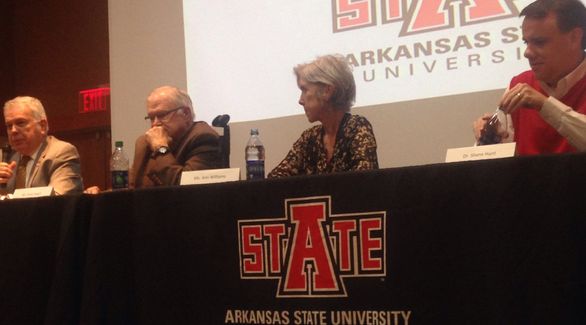Panelists offer advice to college students at International Exhibitions of Countries and Regions
by March 11, 2019 4:56 pm 354 views

A panel of professional and business leaders encouraged college students to be bold and take chances after they graduate from school during Arkansas State University’s eighth annual International Exhibition of Countries and Regions held on the ASU campus.
Four panelists – James Aardappel, director of U.S. Commercial Service, U.S. Department of Commerce in Little Rock; Steve Ewart, alumnus of Arkansas State and retired transportation director (JETS), retired head football coach and teacher at Jonesboro High School; Dr. Shane Hunt, professor of marketing and R.M. “Bob” Wood Endowed Professor in Sales Leadership at ASU; and Ann Williams, an attorney, city council member, and owner of the Edge Coffee House – discussed career strategies.
DR. SHANE HUNT
Hunt was the first person in his family to attend college and when he graduated he immediately applied for a job with a Fortune 500 company, he said. His first job paid him $42,000 – more than anyone in his family made. During the next 19 years, he had several different jobs where he made varying amounts of income and had a wide range of responsibilities.
After receiving his doctorate, Hunt took a job teaching at ASU in 2006. No matter how much money or success a person achieves, one key to success in the professional world is helping others the way you’ve been helped, he added.
“I had no idea where I would end up. I grew up in the middle of the country … you have to find your own way. You have to find your own peace,” he said.
ANN WILLIAMS
Williams grew up in Jonesboro and when she graduated from high school she decided to go to college at Wake Forest. Moving far away from her family was tough, but it was one of the many times in her life that Williams decided to take a risk, she said. Her college education exposed her to different people with different points of view, she added.
When she decided to attend law school, she took another risk. Only about 20% of law students during the 1970s were female, she said. After law school, she took a job as a staff attorney for the Arkansas Legislature. Many of her colleagues were male, she said. Eventually, she took a job in New York City for 10 years, and then returned to Arkansas to work as a lawyer for the Department of Human Services. In 2001, she opened the Edge Coffee House.
“Don’t be afraid. Don’t be governed by fear,” she said.
JAMES AARDAPPEL
Aardappel grew up in a town of about 5,000 people and knew nothing about global or international issues. His work in business took him around the world – he lived in Japan for four years at one point. Opportunities have to be seized upon, he said. In his current job as the director of the U.S. Commercial Service, U.S. Department of Commerce in Little Rock he helps state manufacturers get their products into countries around the world, he added.
Setting goals, big and small are key, too, he added. There was a time when a company he worked for needed someone who was a certified scuba diver on the staff and it was something he’d always wanted to do. His boss said he wouldn’t be able to get the certification. It fueled him further and he received the certification, he added.
“Success is doing something you want to do and achieving it,” he said.
STEVE EWART
Ewart, a Helena native, has worn many hats during his 50-year work career. He worked for a time as a Washington D.C. police officer while he took a stab at law school. He studied engineering, and eventually ended up back at ASU and received a degree in history. He was offered a teaching position and ultimately spent more than 30 years in education serving as a stint as the head football coach for Jonesboro High School.
Ewart was tapped by Mayor Harold Perrin to launch the city public transportation program in 2008 known as JETS. He received this position after he’d retired – for the second time. Being a coach taught him how to take shots and it also molded his definition of success. Early in his career, he equated it with accolades. After he won a state championship in 1979, he realized nothing had really changed. Impacting people’s lives is a much better indicator of success, he said.
“Find your passion, and you will find your energy,” he said.
